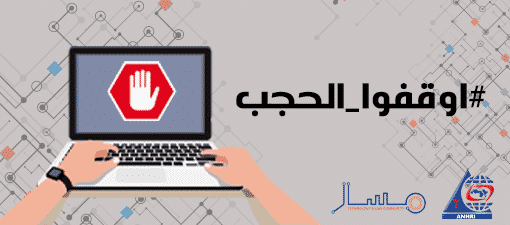ANHRI & “Masaar” launch “Stop the Block” Campaign
demanding an end to the practices of the website blocking and Internet censorship in Egypt

The wave of Internet sites ban started with blocking 21 press and news websites, including “Mada Masr”, as well as the websites belonging to Al Jazeera Media Network and the other Qatari or Muslim Brotherhood- affiliated websites. Thereafter, the Egyptian authorities continued to practice the blocking of websites by including those that provide tools to circumvent the ban and Internet censorship, in addition to the websites of human rights organizations, blogs and news websites, which led to expanding the range and number of the blocked websites overall.
Human rights organizations have so far monitored at least 628 links being blocked in Egypt, including 596 websites and 32 alternate links which were used by the blocked websites to reach their audience instead of the links that were blocked. The banned websites also included 116 press and media websites and 349 websites that provide services to bypass the ban (Proxy and VPN), in addition to: 15 websites that are concerned with human rights issues, 11 cultural websites, 17 chat/communication websites, 27 political criticism websites, 8 blogs and blog hosting websites, and 12 websites for sharing Multimedia, along with a number of other miscellaneous websites.
Through the “Stop the Block” Campaign, the Arabic Network for Human Rights Information (ANHRI) and the Community for Technology and Law “Masaar” aim to support the public’s right to access knowledge, the freedom of digital media and the circulation of information, in light of the authorities’ control over most of the visual, audio, written and digital media. The two organizations also launch the campaign to demand the public to pressurize the Egyptian authorities to lift the ban on the aforementioned websites and stop censoring the Internet.
It’s noteworthy that it has been three years since the Egyptian authorities started the websites blocking practices on a large scale. However, and till today, there is no legal ground or basis to block this huge number of websites, except for a decision issued by the Inventory, Seizure and Management Committee of Muslim Brotherhood Funds to block 33 websites.
It’s worth mentioning that that there are a number of lawsuits filed by human rights organizations together with press and media platforms; including the case lodged by the Arabic Network for Human Rights Information (ANHRI) against the backdrop of blocking the “Al-Araby Al-Jadeed” website and another case filed by the Association for Freedom of Thought and Expression (AFTE) demanding to halt the implementation of the government’s detrimental decision refraining from giving an official response regarding its decision to block AFTE’s website. The case also demanded to oblige the government to clarify the administrative and technical reasons that led to the blocking of the websites in addition to obliging telecommunications service providers to remove the technical obstacles so as to enable users to access the website. “Mada Masr” has also filed a lawsuit demanding the suspension of the implementation of the government’s detrimental decision refraining from giving an official response regarding the decision to block its website. The lawsuit also requested to oblige the government to clarify the administrative and technical reasons that led to the blocking of the websites in addition to obliging telecommunications service providers to remove the technical obstacles so as to enable users to access the website. Moreover, “Al-Sharq” TV channel filed a lawsuit demanding to reverse the decision to block its website “Al-Sharq”.
As part of the “Stop the Block” Campaign, both “Masaar” and ANHRI will publish a list of the websites that have been blocked during the previous period. The two organizations will also send letters to: the UN Special Rapporteur on the Promotion and Protection of the Right to Freedom of Opinion and Expression, the Special Rapporteur on the Situation of Human Rights Defenders, the United Nations Educational, Scientific and Cultural Organization “UNESCO”, the National Telecom Regulatory Authority (NTRA) and the Supreme Council for Media Regulation (SCMR). Furthermore, ANHRI and “Masaar” will publish a report that includes a timeline explaining how the practices of website blocking have developed in Egypt since 2017 in addition to publishing information and data about the state of Internet censorship in Egypt.
You can follow the campaign’s activities through the following links:
The Community for Technology and Law “Masaar” website: Masaar.net
The Arabic Network for Human Rights Information (ANHRI)’s website: anhri.info
“Masaar” Facebook official page: https://www.facebook.com/masaarnet
ANHRI’s Facebook page: https://www.facebook.com/AnhriHr/
Masaar’s account on Twitter: https://twitter.com/masaarnet
ANHRI’s account on Twitter: https://twitter.com/anhri
